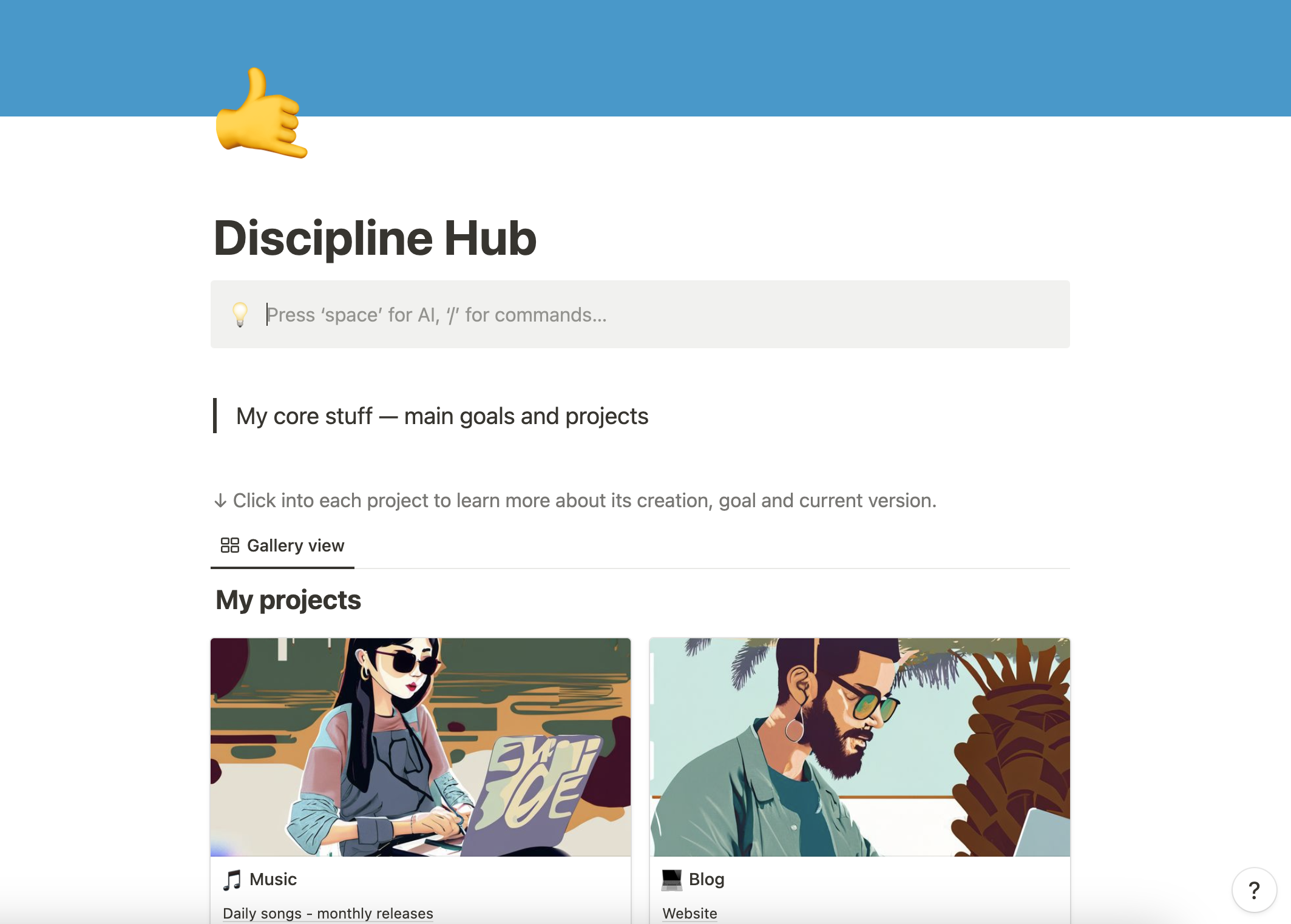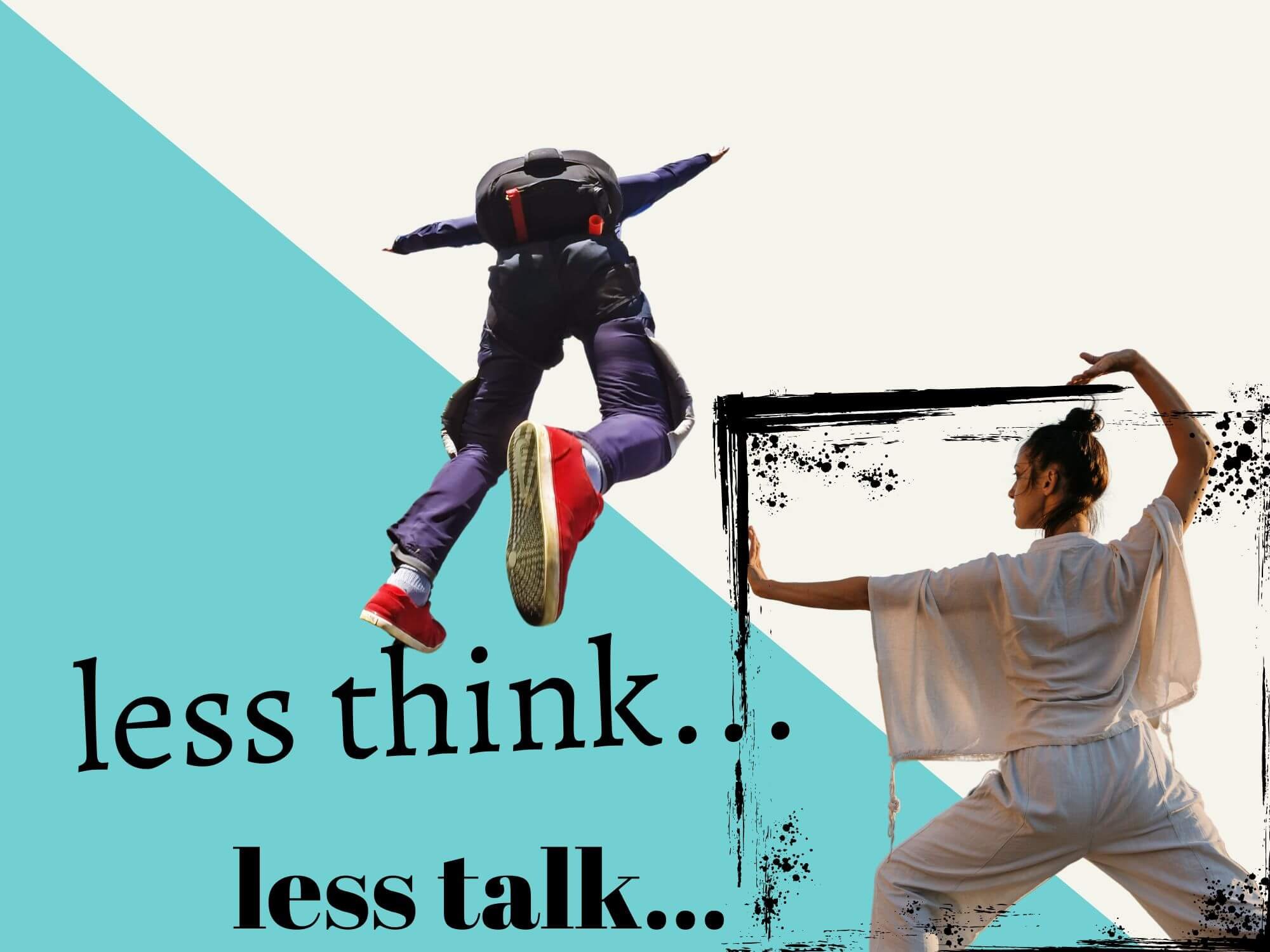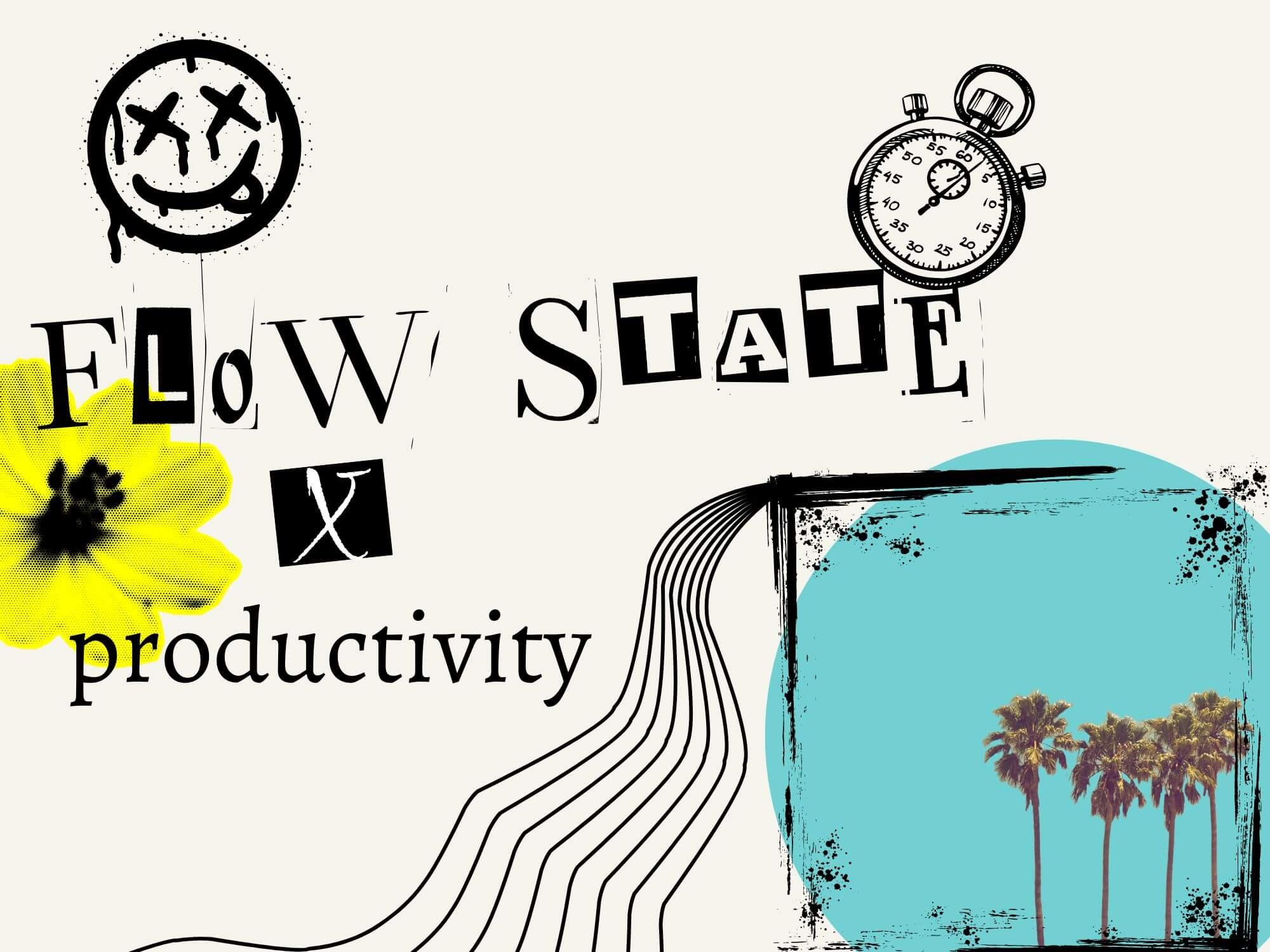Discipline and Consistency Make You Unstoppable (12 epic tips)
Whether I’m making new music, finding new clients or working on this blog, discipline and consistency are two things that always lead to growth and give me a sense of control.
They quite simply make you unstoppable.
Or as many have echoed, the biggest differentiator of successful people is they simply never quit. Struggles were felt, failures were endured and doubts were felt. And yet, they persevered.
I think you’re that type of person (which is probably why you’re here in the first place).
So let’s crush it together. This post shares my favorite moves for building stronger discipline and becoming more consistent.
Alright, enough chit chat.
Let’s do this.
Table of Contents Show
Hey there, just a heads up some links in this post may be affiliate links, which earn me a small commission. This is at no extra cost to you, but helps me keep the lights on. Thanks for your support!
Discipline vs. Consistency (definitions + benefits)
“Doing ordinary things for an unordinary amount of time creates extraordinary results.”
You will become more disciplined and consistent. But first, definitions.
Discipline is the ability to take action when there’s no motivation or proof (i.e., no results).
And consistency is the ability to do those things for an extended amount of time.
Since great things tend to take a great amount of work and a great amount of time, these two ingredients are lead characters in your movie called Success.
They’re two sides of the same coin.
And remember, discipline doesn’t mean only taking action on the hard things. It’s the ordinary stuff too that’s important.
You know what I mean, those simple tasks like sending an email or a quick text.
These are micro bottlenecks that compound and take up mental space in your psyche.
So what are the benefits of boosting your discipline and consistency? Here are some of my favorite perks:
You build and stack skills
You strengthen your weaknesses
You respond to new challenges better
You build new habits
You develop a stronger growth mindset
You have better patience
You get good at playing the long game
Develop Discipline + Consistency (12 kick-ass tips)
Often, a difference in talent — in results — is really just a difference in how you spend your free time.
These are my top moves for building stronger discipline and consistency.
1. Find Your ‘Keystone Habit’
A keystone habit is a habit that ends up influencing other parts of your life, creating a sort of snowball effect of new habits.
Charles Duhigg discusses the concept in his book ‘The Power of Habit’.
A common example of a keystone habit is exercise.
Often, people who start exercising end up developing better habits in other parts of their life. Perhaps it’s the boost in energy or the newfound confidence. Whatever the case, it works.
So the trick here is to identify what your keystone habit could be. While exercise is common, there are plenty of other examples, such as:
Developing a meditation routine
Journaling more
Eating healthier
Spending time around more inspiring people
Financial management
Going to bed earlier
It helps to consider what your biggest obstacles or bottlenecks are in your life. Often, these may represent a keystone area to focus on first.
2. Know Your Anchors
Discipline and consistency is the ability to not drift too far off course, so it helps to know what your anchors are.
Anchors are the things that best represent you. I usually focus on five key areas:
My values
My purpose
My goals
My passions
My skills
Understanding your anchors makes it easier to develop personalized workflows and find motivation for more discipline and consistency. They add purpose and intention to your actions and life.
Your anchors often represent your why.
It’s simple. And it works.
If you’ve never given your values any serious thought, try out the free test at personalvalu.es. It takes about 20 minutes and will give you your top 5 values.
The test also gives you a free downloadable phone screen image with your main values. So every time I look at my phone, I’m reminded of my values.
3. Find Clarity With Reverse Thinking
Why are you not being disciplined and consistent? What actions are causing issues?
Sometimes, we need clarity — and reverse thinking helps.
Reverse thinking is a thought exercise where you think of how to make something worse, and in doing so, you often find optimal (sometimes obvious) paths forward.
So rather than trying to find solutions and strategies for being more disciplined, come up with a bunch of ways to become less disciplined.
For example, here are some ways to become less discipline and less consistent:
Wait until tomorrow to start
Look for outside validation
Only do things that are comfortable
Take advice from people who are not disciplined and are not consistent
Don’t follow through with what you say you’re going to do
Change focus often
These ideas can feel facetious. But often, you’ll uncover fresh insights hiding in plain sight.
4. Set An Hourly ‘Discipline Alarm’
This is a recent life hack I’ve found — I got the idea from Regan Hillyer. And here’s how it works.
Everyday, after waking. up, I simply set a timer to go off every hour. This alarms repeats all day.
I also choose a peaceful, soothing sound (or vibration), so it’s not jarring or disruptive. It’s a gentle reminder to pause and reflect on what I'm doing. When the sound alarms, I ask myself some simple questions, like:
Am I acting disciplined and consistent?
Am I putting off or avoiding something?
Am I embodying the future version of myself, who is disciplined and consistent?
Every hour, I have a micro moment to reflect on what I’m doing and how I’m thinking. If something is off, I try to course-correct.
Actually, as I’m updating this post, my alarm just went off now — so apropos!
It’s like a friend checking in and asking if you’re putting things off or actually doing what you should be doing to reach your goals or create your dream life.
Eventually, I’ve noticed, this alarm thing changes my subconscious and routines, so I’m more consistently embodying my aligned habits, thinking patterns and beliefs.
(this alarm trick works for other changes or goals you’re trying to reach too)
5. Create A Disciplined Alter Ego
This tip is all about mindset and the stories we tell ourselves.
So what stories do you tell yourself about yourself? What do you assume you can or can’t do?
What negative beliefs about your discipline do you tell yourself?
Often, the stories, doubts and negative dogmas we have about ourselves are subjective and inaccurate. But they become a self fulfilling prophecy.
By constantly saying, believing and reaffirming that you not disciplined, you become less disciplined. Our beliefs and the stories we tell ourselves reaffirm and perpetuate the very things we seek to change.
So let’s write a new story.
This is where creating an alter ego comes in. We can quite literally create a new life and then step into it.
This is a fun and creative process.
Here’s how I do it:
Define the limiting beliefs and character traits you currently have
Identify the new beliefs and character traits you need for more discipline
Adopt those new beliefs and character traits by emotionally embracing them
Start acting and speaking differently, to match your new avatar
Become your new disciplined self
Eventually, the bridge between your alter ego and your current self will get smaller, to the point where you won’t need your alternative persona any more.
An alter ego steps around obstacles of self belief or limiting character traits.
So what’s your new story? Become that person.
6. Don’t Break Old Habits (build new ones)
Breaking habits is hard. But focusing on building new ones is easier and more fun.
Eventually, these new habits will replace the old ones. That’s the idea, at least.
And it’s about attention, really.
When we try to break old habits, all of our attention and energy is going to the very thing we’re trying to stop — our old habits. It’s a bit of a paradox.
So a “simple” fix is to shift your attention to building new habits, not stopping stubborn ones.
This technique has less friction. It’s focused on growth, creativity and building rather than the stress of trying to quit something.
Here are some ways to build new habits (to replace the older ones):
Track your progress
Try using a habit app (like Todoist or even a Google Doc/Notion page)
Have a daily nonnegotiable
Start with a small daily requirement, and add to it the more you do it
Try gamifying things
For example, I did a challenge of writing one new song everyday for a year
Map out your habit loop
Identify old cues that prompt old habit
Create new cues for your new habit goals (and attach some reward systems to them)
7. Create A Personal Discipline Hub
This is a snapshot of my hub. I just used a free ‘Design Portfolio’ template from Notion (grab a free account here)
Let’s get smart. Let’s get strategic.
Let’s create a personal discipline hub. But what is it?
A personal discipline hub is a place to track and manage all of your habits, tasks and goals. It’s like a digital home to organize your life, goals and important tasks.
If you’re creative and like organizing things (like me), this will definitely improve your discipline and consistency.
It’s incredibly powerful and methodical.
(otherwise, everything is just floating around in our heads and not attached to anything tangible)
Personally, this was one of the biggest reasons for my discipline woes. Luckily, creating a discipline hub was a simple solution.
Here’s how:
Choose a platform for your new hub
Add your stuff and organize everything into related buckets and pages
Create a system for each of each of your things
I like to systematize things by working backwards
I first break down big goals and tasks into micro ones
I then break down each micro moment into nano tasks to work on daily
Monitor things
8. Aim Lower
Having and identifying a big goal is amazing and exciting.
But reaching these big ideas can feel like staring up at a mountain, wondering how we’re going to get to its peak.
So shift focus and just take small steps forward. Put another way, aim lower.
This is a strategic way to creates sustainable and reliable results (thanks to compound effects). It’s easier and more realistic to focus on smaller, daily tasks over larger ones.
So to do this, it helps to think backwards and reverse engineer your goals. This will give you a map, like a step-by-step action plan with checkpoints to focus on.
Here’s a simple formula for breaking down a discipline and consistency goal:
Break down the main goal into micro goals
What key habits, events and things need to happen to become disciplined and consistent?
Break down each micro goal into even smaller nano goals
Focus on the small nano goals everyday and each week
Create an action plan to chip away at them
Focus on reaching one micro goal at a time, until you reach them all
Once all of your micro goals are met, your main goal (discipline and consistency) will be met
9. Pattern Interrupt (do more hard things….)
This one is a bit obvious, but if we want to build discipline, we should do more things that build discipline.
Because it’s easy to talk about boosting discipline — but putting things off for our future selves is always easier than just starting.
As we know, later turns into tomorrow, which turns into after the weekend, after the holidays…and so on.
So let’s nip this cycle in the bud.
Here are some ideas to start adding more disciplined habits into a day-to-day routine:
Go to the gym or start an exercise routine
Start taking only cold showers
Meditate everyday for at least 20 minutes
Quit drinking or smoking
Try going meatless or vegan on some days
Start a daily journal
Learn a language
Wake up earlier
10. Stop Waiting for Motivation or Convenient Timing
I think we all know this one.
Don’t wait for the right moment, or the right motivation or the perfect conditions to take action — because it’ll never happen.
But if it does, it doesn’t last.
If we rely solely on motivation or ideal conditions for discipline, then we’re creating the assumption that when things get busy or less than ideal again, we’ll stop and wait.
It’s not realistic and creates a fragile foundation to work from. It sets us up for disappointment when things inevitably get difficult or life gets busy.
So here are some ways to avoid the waiting trap:
Create a workflow
Unplug from distractions like social media
Timebox your to-do lists and make a schedule
Just take small action (try to focus for just 5 minutes)
Stack the cards in your favor (see #9 below for more on this)
Recognize burnout and don’t feel bad for taking some time for yourself too
11. Define Your Motivators (+ your stressors)
Having great discipline is (in part) having a clear understanding of what motivates you (and what adds stress).
So let’s define these points so we can better control things.
A motivator is something that inspires you and motivates you to take some action.
A stressor is something that causes you to freeze and not take action. They can be subtle, and still cause the whole system to fall apart (like a single point of failure).
So stressors and motivators matter.
For example, too much stress can cause us to fall back into old bad habits and make poorer choices.
So a good starting point here would be to work towards reducing stressful moments in our day and life.
Here are a few more examples of things that can cause stress in our discipline systems:
Weaknesses
Process bottlenecks
Pain points
Unrealistic time horizons
Now here are some quick tips for managing stressors and motivators:
Work and grow from your zone of proximal development
Find the perfect balance of pressure (not too much, but not too little)
Leverage your strengths — outsource your weaknesses
Automate things and use modern tech tools where you can
12. Stack the Deck
I love this tip. It’s so important, and gives me a sense of control over things.
Because here’s the truth: we’re constantly influenced and swayed by our environment and the people or things we spend time around.
So lets stack the cards in our favor.
Here are three key areas I like to focus on optimizing for motivation and discipline:
My inner circle
The people I spend the most time with
My outer circle
The type of content I consume
My environment
The space(s) I spend the most time in
The concepts here are pretty simple and hard to argue with.
I mean:
Surround yourself with more people who represent your future goals (people who are disciplined and show up consistently).
Yep, makes sense.
Listen to, read and consume content that motivate and inspires you to show up and take action consistently.
Uh huh, checks out.
Create an environment that removes temptations and is motivating and specific for building discipline (everything from design, smell, colors, sounds, etc.).
For sure, that tracks.
So remember, stack the deck in your favor.
We are as good as our environments.
Later ✌️
Discipline and consistency is the process of becoming a new version of yourself.
A version that already exists (somewhere in the quantum space of time and reality).
But remember, go easy on yourself.
Set alarms for reminders, find your keystone habit(s) and create an alter ego. But stay patient and don’t feel bad about having bad days. It’s all part of the process.
No one can be 100%, 100% of the time. That’s unsustainable.
You’re probably doing better than you think.
Want More? Okay. Here’s More.








